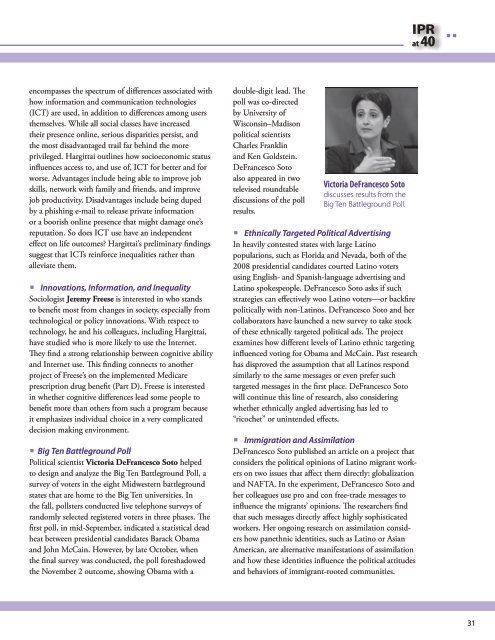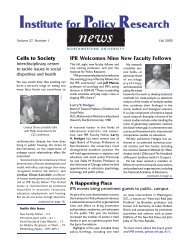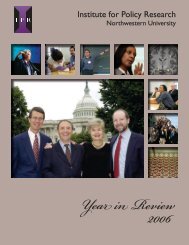IPR - Institute for Policy Research - Northwestern University
IPR - Institute for Policy Research - Northwestern University
IPR - Institute for Policy Research - Northwestern University
Create successful ePaper yourself
Turn your PDF publications into a flip-book with our unique Google optimized e-Paper software.
<strong>IPR</strong><br />
at 40<br />
encompasses the spectrum of differences associated with<br />
how in<strong>for</strong>mation and communication technologies<br />
(ICT) are used, in addition to differences among users<br />
themselves. While all social classes have increased<br />
their presence online, serious disparities persist, and<br />
the most disadvantaged trail far behind the more<br />
privileged. Hargittai outlines how socioeconomic status<br />
influences access to, and use of, ICT <strong>for</strong> better and <strong>for</strong><br />
worse. Advantages include being able to improve job<br />
skills, network with family and friends, and improve<br />
job productivity. Disadvantages include being duped<br />
by a phishing e-mail to release private in<strong>for</strong>mation<br />
or a boorish online presence that might damage one’s<br />
reputation. So does ICT use have an independent<br />
effect on life outcomes? Hargittai’s preliminary findings<br />
suggest that ICTs rein<strong>for</strong>ce inequalities rather than<br />
alleviate them.<br />
< Innovations, In<strong>for</strong>mation, and Inequality<br />
Sociologist Jeremy Freese is interested in who stands<br />
to benefit most from changes in society, especially from<br />
technological or policy innovations. With respect to<br />
technology, he and his colleagues, including Hargittai,<br />
have studied who is more likely to use the Internet.<br />
They find a strong relationship between cognitive ability<br />
and Internet use. This finding connects to another<br />
project of Freese’s on the implemented Medicare<br />
prescription drug benefit (Part D). Freese is interested<br />
in whether cognitive differences lead some people to<br />
benefit more than others from such a program because<br />
it emphasizes individual choice in a very complicated<br />
decision making environment.<br />
< Big Ten Battleground Poll<br />
Political scientist Victoria DeFrancesco Soto helped<br />
to design and analyze the Big Ten Battleground Poll, a<br />
survey of voters in the eight Midwestern battleground<br />
states that are home to the Big Ten universities. In<br />
the fall, pollsters conducted live telephone surveys of<br />
randomly selected registered voters in three phases. The<br />
first poll, in mid-September, indicated a statistical dead<br />
heat between presidential candidates Barack Obama<br />
and John McCain. However, by late October, when<br />
the final survey was conducted, the poll <strong>for</strong>eshadowed<br />
the November 2 outcome, showing Obama with a<br />
double-digit lead. The<br />
poll was co-directed<br />
by <strong>University</strong> of<br />
Wisconsin–Madison<br />
political scientists<br />
Charles Franklin<br />
and Ken Goldstein.<br />
DeFrancesco Soto<br />
also appeared in two<br />
televised roundtable<br />
discussions of the poll<br />
results.<br />
Victoria DeFrancesco Soto<br />
discusses results from the<br />
Big Ten Battleground Poll.<br />
< Ethnically Targeted Political Advertising<br />
In heavily contested states with large Latino<br />
populations, such as Florida and Nevada, both of the<br />
2008 presidential candidates courted Latino voters<br />
using English- and Spanish-language advertising and<br />
Latino spokespeople. DeFrancesco Soto asks if such<br />
strategies can effectively woo Latino voters—or backfire<br />
politically with non-Latinos. DeFrancesco Soto and her<br />
collaborators have launched a new survey to take stock<br />
of these ethnically targeted political ads. The project<br />
examines how different levels of Latino ethnic targeting<br />
influenced voting <strong>for</strong> Obama and McCain. Past research<br />
has disproved the assumption that all Latinos respond<br />
similarly to the same messages or even prefer such<br />
targeted messages in the first place. DeFrancesco Soto<br />
will continue this line of research, also considering<br />
whether ethnically angled advertising has led to<br />
“ricochet” or unintended effects.<br />
< Immigration and Assimilation<br />
DeFrancesco Soto published an article on a project that<br />
considers the political opinions of Latino migrant workers<br />
on two issues that affect them directly: globalization<br />
and NAFTA. In the experiment, DeFrancesco Soto and<br />
her colleagues use pro and con free-trade messages to<br />
influence the migrants’ opinions. The researchers find<br />
that such messages directly affect highly sophisticated<br />
workers. Her ongoing research on assimilation considers<br />
how panethnic identities, such as Latino or Asian<br />
American, are alternative manifestations of assimilation<br />
and how these identities influence the political attitudes<br />
and behaviors of immigrant-rooted communities.<br />
31
















